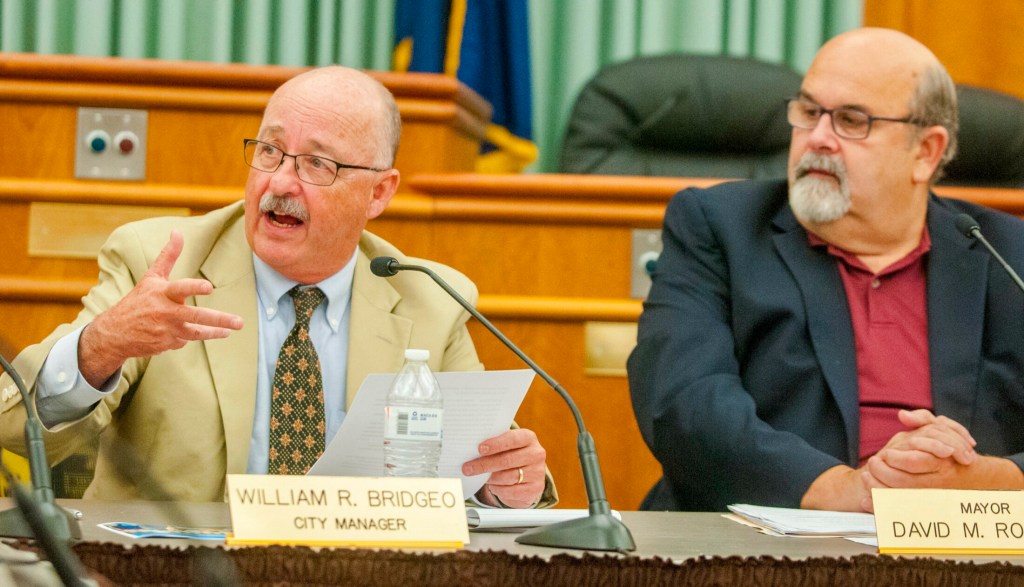AUGUSTA — City councilors have approved a $1.1 million lease-purchase deal that will provide funding to buy the roughly 2,200 streetlights that light up city streets and other areas from Central Maine Power and replace them with more efficient LED lights.
The move, according to City Manager William Bridgeo, is expected to save the city $168,000 a year during the 10-year period when the city will repay TD Bank, provider of the lease-purchase agreement, for the $1.1 million needed to buy and install the lights, and more than $300,000 a year after the lights are paid off.
Bridgeo said the light takeover and upgrade also will result in the city using about 600,000 fewer kilowatt hours a year because of the increased efficiency of the lights. The light emitted will be of better quality and less likely to create light pollution, and allow for faster repair when a light goes out.
“So the residents of our community are going to benefit from the city being greener, that we’re saving a lot of money and the service is going to be better in the quality of the lighting, and in the rather instantaneous response when streetlights are out,” Bridgeo told councilors before their vote on the financing plan. “So it’s a great project and this is the last piece that needs to be completed.”
Councilors voted unanimously, and without comment, in favor of the funding plan Thursday.
Bridgeo said eight to 10 Maine communities already have started making the move from leasing streetlights from utility providers CMP and Emera, and several in central Maine are considering or working on joining Augusta in contracting with Affinity LED Lighting, a New Hampshire company that was the low bidder to provide the lights to Augusta, to make the move.
“We invited several communities in the area who are piggy-backing on our contract,” Bridgeo said. “Gardiner has expressed interest in doing that, Waterville has, Vassalboro, Hallowell. … So we may be spurring more activity right around here. We’re fortunate we have the in-house resources, as a larger community, to manage a project like this. Affinity said they’ll honor our prices in those communities, so they’ll know what they’re getting was part of a competitive (bidding) process. I expect we’ll start seeing a lot more of it as time goes on.”
Ralph St. Pierre, Augusta’s finance director and assistant city manager, estimates the proposal would save the city about $168,000 a year for 10 years while the money used to buy the lights is paid back. Once the lights and fixtures are paid for — after the initial 10-year period — St. Pierre estimates the city would save $306,000 a year for as long as the lights last.
The LED fixtures have a projected lifespan of about 28 years.
The change was made possible by state legislation and Public Utilities Commission rules changes passed in 2016 that requires CMP to sell streetlights to municipalities where they are located for the net book value of the fixtures. Before the law change, the utility company was under no obligation to sell its streetlights to municipalities. It charged a rate for the electricity used by the lights approved by the PUC, but it also could charge communities a fee to rent the light fixtures.
Augusta was paying CMP $223,000 a year to lease streetlights, plus $39,000 in delivery fees. Buying the old fixtures, some of which are 50 years old, cost the city about $206,000.
Bridgeo said installation should start in the next two weeks and should be complete in mid-April. Randolph-based Coutts Brothers has a contract to install the lights.
Most of the new streetlights will be equipped with Wi-Fi devices that will allow them to communicate with each other and report to a network system that will be based at Augusta City Center. That means when a light stops working, officials will know about it immediately.
Bridgeo said the city thus will be able to repair broken lights instantaneously.
He said streetlights in outlying areas of the city won’t be equipped with the Wi-Fi technology, because they are too far apart to communicate with each other.
They also are expected to limit the amount of light escaping up into the sky, which Steve Lieber, founder and owner of Affinity, said could allow residents to see stars they couldn’t see before. Lieber also has told city officials that all members of Affinity’s crew of assembly technicians are U.S. military veterans.
Keith Edwards — 621-5647
kedwards@centralmaine.com
Twitter: @kedwardskj
Send questions/comments to the editors.




Success. Please wait for the page to reload. If the page does not reload within 5 seconds, please refresh the page.
Enter your email and password to access comments.
Hi, to comment on stories you must . This profile is in addition to your subscription and website login.
Already have a commenting profile? .
Invalid username/password.
Please check your email to confirm and complete your registration.
Only subscribers are eligible to post comments. Please subscribe or login first for digital access. Here’s why.
Use the form below to reset your password. When you've submitted your account email, we will send an email with a reset code.